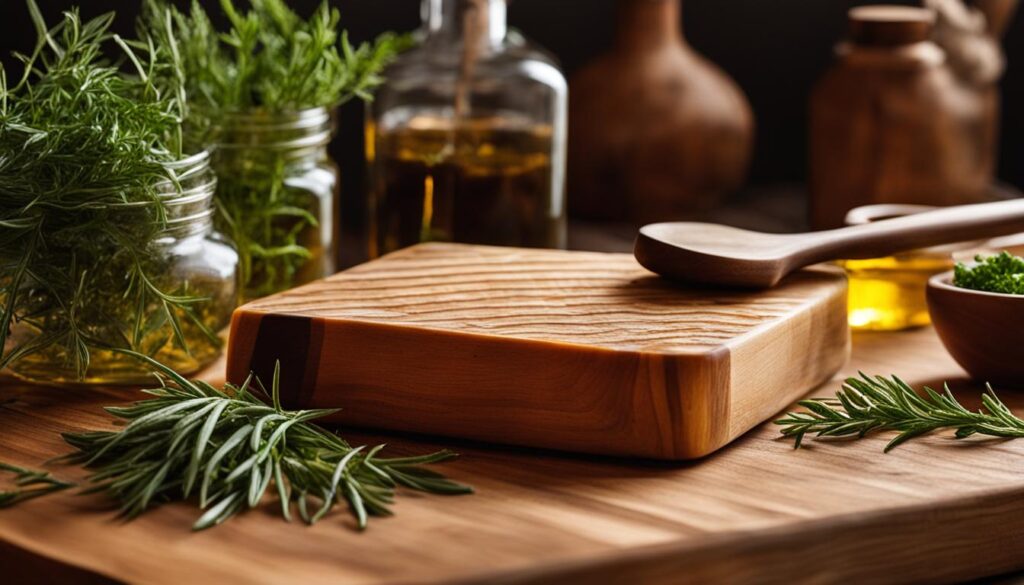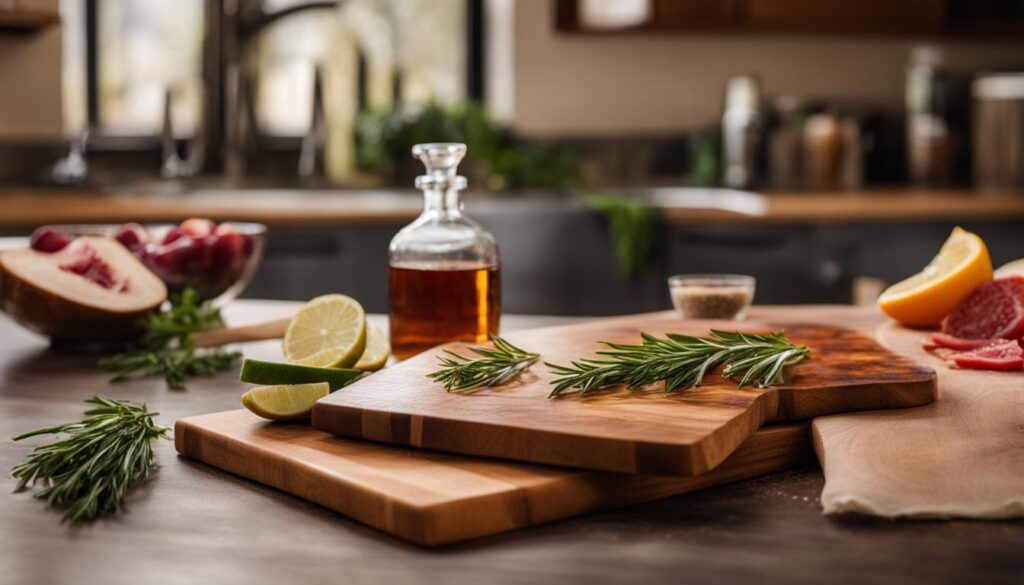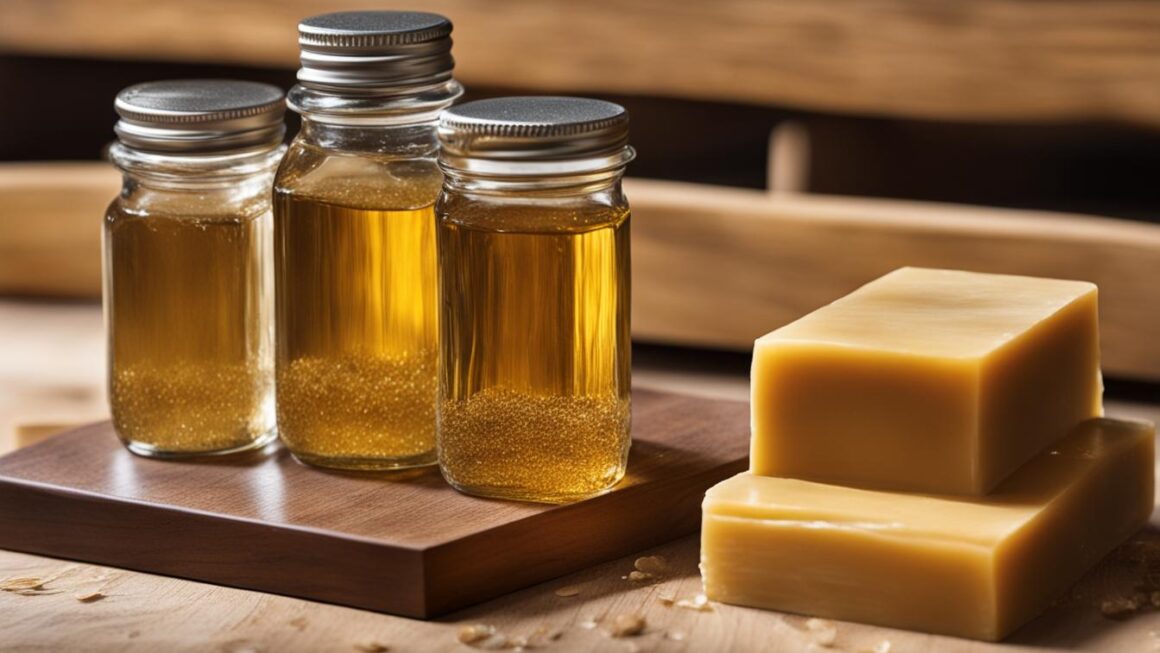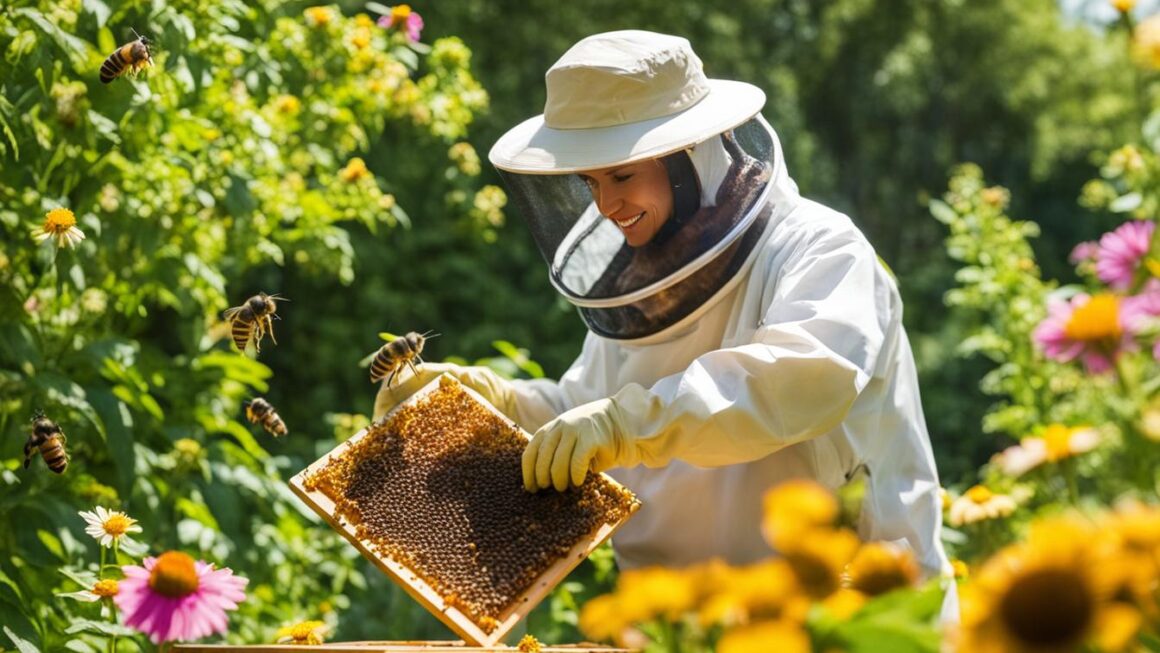Mineral oil and beeswax are two popular options for maintaining and protecting butcher block countertops. Both are safe for food contact and provide different benefits. Let’s explore the key differences and how to choose the best option for your butcher block.
Key Takeaways:
- Mineral oil and beeswax are safe options for maintaining butcher block countertops.
- Mineral oil penetrates the wood, preventing water and food absorption.
- Beeswax hydrates, shines, and waterproofs the wood.
- Consider your specific needs and preferences when choosing between mineral oil and beeswax.
- Regular maintenance is essential for keeping your butcher block in top condition.
Why Use Mineral Oil for Butcher Block
Mineral oil is a popular choice for maintaining and caring for butcher block countertops. It offers several benefits that make it an excellent option for keeping your butcher block in top condition.
One of the primary reasons to use mineral oil is its food-safe nature. When applied to the wood surface, mineral oil penetrates the wood, creating a protective barrier that prevents water and food absorption. This helps to keep your butcher block clean and fresh, reducing the risk of stains and odors.
It’s crucial to use a food-grade mineral oil specifically designed for butcher blocks. Other oils like coconut oil, olive oil, and linseed oil should be avoided as they can become rancid and are not food-safe.
The Benefits of Using Mineral Oil for Butcher Block:
- Food-safe and non-toxic
- Prevents water and food absorption
- Maintains the freshness and appearance of the wood
“Using mineral oil on your butcher block is a safe and effective way to protect and preserve its natural beauty for years to come.” – Butcher Block Care Experts
Regular application of mineral oil is essential to maintain the integrity of the butcher block. Initially, apply the oil daily for a week to fully saturate the wood. After that, a monthly or bi-monthly oiling is recommended, depending on your climate conditions. Adjust the frequency as needed to ensure the wood remains well-hydrated and protected.
Next, let’s explore how to apply mineral oil to your butcher block and ensure proper maintenance.
How to Apply Mineral Oil to Butcher Block
Properly applying mineral oil is essential for maintaining the beauty and longevity of your butcher block countertop. The process is simple and can be incorporated into your regular cleaning routine. Follow these steps to ensure effective and thorough application:
- Start by cleaning the surface of your butcher block. Remove any food remnants or debris using a gentle cleanser and warm water. Dry the surface completely before proceeding.
- Pour a liberal amount of food-grade mineral oil directly onto the butcher block. Use a clean, lint-free cloth or a soft-bristled brush to spread the oil evenly across the surface.
- Allow the mineral oil to soak into the wood for at least 15 minutes. This allows the oil to penetrate the surface and provide optimal protection against water absorption.
- After the oil has had time to absorb, use a clean cloth to wipe away any excess oil. This step is crucial to prevent a sticky residue from forming on the countertop.
- For added protection and shine, consider using a butcher block conditioner. These products are specifically formulated to enhance the natural beauty of the wood and provide an extra layer of defense against stains and spills.
Adjusting the Application Frequency
It’s important to establish a regular maintenance schedule for your butcher block countertop. Initially, apply mineral oil daily for a week to ensure that the wood is properly nourished. After the initial conditioning period, maintain your countertop by oiling it once a month or every 3 to 4 weeks. However, the frequency may vary depending on your climate conditions. Dry climates may require more frequent oiling, while humid environments may necessitate less frequent application.
By following these simple steps and establishing a regular maintenance routine, you can keep your butcher block countertop in optimal condition for years to come.

Benefits of Beeswax for Butcher Block
Beeswax is a fantastic option for maintaining your butcher block countertops. It offers a range of benefits that can help keep your butcher block looking its best. Here are some key advantages of using beeswax:
Hydration:
Beeswax effectively hydrates the wood, preventing it from drying out and becoming brittle. This helps to maintain the structural integrity of the butcher block and prolong its lifespan.
Shine:
Beeswax provides a beautiful shine to your butcher block, enhancing its natural beauty. The glossy finish adds a touch of elegance to your kitchen and makes your countertop look more visually appealing.
Waterproofing:
One of the main benefits of beeswax is its ability to waterproof the wood. It creates a protective barrier that repels water, preventing it from seeping into the wood and causing damage. This is especially important in the kitchen where spills and moisture are common.
“Using beeswax on your butcher block not only protects the wood, but it also adds a warm, natural glow that can’t be achieved with other products.”
Whether used in combination with mineral oil or as a standalone product, beeswax is a versatile option that can greatly benefit your butcher block. It restores the natural beauty of the wood, protects it from stains and spills, and adds a touch of elegance to your kitchen.
Table: Comparing Beeswax and Mineral Oil for Butcher Block Maintenance
| Benefits | Beeswax | Mineral Oil |
|---|---|---|
| Hydration | ✓ | ✓ |
| Shine | ✓ | X |
| Waterproofing | ✓ | ✓ |
| Food-Safe | ✓ | ✓ |
As shown in the table above, both beeswax and mineral oil offer hydration and waterproofing benefits for your butcher block. However, beeswax provides an additional advantage of adding shine to the wood. It’s important to note that both options are food-safe and suitable for use in the kitchen.
How to Use Beeswax on Butcher Block
To maintain and care for your butcher block, beeswax is another effective option. This natural ingredient not only hydrates and shines the wood but also acts as a waterproofing agent, protecting it from stains and spills. To ensure proper application and achieve the desired results, follow these steps:
Gather the necessary materials:
- Beeswax (ready-made or for DIY, blend 1 part beeswax with 4 parts mineral oil)
- Clean cloth or sponge
Step-by-step process:
- Clean the butcher block surface thoroughly, removing any food particles or residue.
- If using a ready-made beeswax product, follow the instructions provided by the manufacturer.
- If making your own beeswax mixture, melt it in a double boiler or microwave until it becomes a liquid.
- Dip the clean cloth or sponge into the beeswax mixture and apply it evenly to the entire surface of the butcher block.
- Allow the beeswax to sit on the wood for a few minutes.
- Using a clean cloth, gently buff the surface in circular motions to remove any excess beeswax.
- Let the beeswax cure for the recommended duration, usually a few hours or overnight.
By following these steps, you can effectively use beeswax to care for your butcher block, maintaining its beauty and prolonging its lifespan.
Other Recommended Options for Butcher Block Care
In addition to mineral oil and beeswax, there are other options for maintaining and protecting your butcher block countertops. Let’s explore some of these alternatives:
Tung Oil
Tung oil is a popular choice for butcher block care due to its hardening properties and water-resistant barrier. It provides a durable finish that can withstand heavy use and regular cleaning. Tung oil enhances the natural beauty of the wood, leaving it with a warm and rich appearance. It penetrates deep into the wood fibers, creating a protective layer that helps prevent staining and water damage. Keep in mind that tung oil takes longer to cure compared to other options, so allow sufficient drying time before using the countertop.
Carnauba Wax
If you’re looking for a glossy finish and excellent water resistance, carnauba wax is an excellent choice. It creates a smooth and shiny surface that enhances the visual appeal of your butcher block. Carnauba wax acts as a protective barrier against spills, stains, and moisture, making it ideal for kitchen countertops. It is easy to apply and provides a long-lasting finish. However, regular reapplication may be necessary to maintain its effectiveness.
Coconut Oil
Coconut oil is another option for treating and protecting butcher block surfaces. It is a natural and food-safe product that can help moisturize the wood, preventing it from drying out and cracking. Coconut oil also possesses antimicrobial properties, which can help inhibit the growth of bacteria on your countertops. It is easy to apply and absorbs well into the wood, leaving a soft and smooth finish. Keep in mind that refined coconut oil is recommended for butcher block care, as it has a higher smoke point and less aroma compared to unrefined versions.
When considering alternative options for butcher block care, it’s important to choose products that are safe for food contact and compatible with the type of wood used in your countertops. Test any new product on a small, inconspicuous area before applying it to the entire surface. Regular maintenance and proper cleaning are essential for keeping your butcher block in optimal condition and prolonging its lifespan.
Precautions and Inappropriate Options for Butcher Block
When it comes to maintaining and protecting your butcher block countertops, it’s important to be aware of the precautions and inappropriate options that can potentially damage the wood. Here are some key factors to consider:
Avoid Vegetable Oils
While vegetable oils like olive oil and corn oil are commonly found in kitchens, they should be avoided for butcher block care. These oils can go rancid and affect the taste and smell of food. Instead, opt for food-safe options like mineral oil or beeswax.
Steer Clear of Varnish
Varnish may provide a glossy finish, but it is not recommended for butcher block countertops. Over time, varnish can chip and peel off, especially when exposed to sharp objects. This can result in an unsightly and potentially unhygienic surface. Stick to safer alternatives like mineral oil or beeswax for a more durable and long-lasting protective barrier.
Avoid Rubbing Alcohol
While rubbing alcohol may be effective for disinfecting certain surfaces, it should not be used on wood. Rubbing alcohol is extremely drying and can strip away the natural oils and moisture from the wood, causing it to become brittle and prone to cracks. Instead, opt for gentler cleaning methods like using mild soap and water or a mixture of vinegar and water.

| Precautions and Inappropriate Options | Recommended Alternatives |
|---|---|
| Vegetable Oils (e.g., olive oil, corn oil) | Food-safe options like mineral oil or beeswax |
| Varnish | Mineral oil or beeswax for a durable protective barrier |
| Rubbing Alcohol | Mild soap and water or a vinegar and water mixture for gentle cleaning |
By avoiding vegetable oils, varnish, and rubbing alcohol, you can help maintain the beauty and integrity of your butcher block countertops. Stick to safe and recommended options like mineral oil or beeswax to ensure your wood surfaces stay in top condition for years to come.
Safe and Recommended Cutting Board Maintenance Practices
When it comes to maintaining your cutting boards, it is crucial to follow safe and recommended practices to ensure food safety and prolong their lifespan. Here are some essential tips and techniques to keep your cutting boards in top condition:
1. Use Food-Safe Finishes
Applying food-safe finishes to your cutting boards is essential to protect the wood and prevent the growth of bacteria. Food-grade mineral oil, beeswax, and coconut oil are excellent options for finishing your cutting boards. These finishes penetrate the wood, creating a protective barrier and enhancing the natural beauty of the board.
2. Clean Your Cutting Boards Properly
After each use, wash your cutting boards with hot, soapy water. Use a scrub brush or sponge to remove any food particles or stains. Rinse thoroughly and allow them to air dry. Avoid soaking wooden cutting boards or placing them in the dishwasher, as this can cause warping or splitting.
3. Disinfect Regularly
To disinfect your cutting boards, you can use a solution of 1 tablespoon of unscented bleach diluted in 1 gallon of water. Apply the solution to the cutting board’s surface, let it sit for a few minutes, and then rinse thoroughly. Alternatively, you can use a mixture of equal parts water and white vinegar as a natural disinfectant.
4. Remove Stains and Odors
If your cutting board develops stains or odors, you can use a paste of baking soda and lemon juice to remove them. Apply the paste to the surface and scrub gently with a sponge or brush. Rinse thoroughly and dry the board before applying a fresh coat of food-safe finish.
By following these safe and recommended cutting board maintenance practices, you can ensure the longevity and hygiene of your cutting boards, creating a safe and clean environment for food preparation.
Conclusion
When it comes to choosing the best option for butcher block care, both mineral oil and beeswax have their advantages. Mineral oil is a food-safe choice that effectively penetrates the wood, preventing water absorption and maintaining the freshness of the countertop. On the other hand, beeswax provides hydration, shine, and waterproofing properties, restoring the natural beauty of the wood and creating a protective barrier against stains and spills.
Ultimately, the decision between mineral oil and beeswax depends on your specific needs and preferences. If you prioritize water resistance and optimal wood preservation, mineral oil is the way to go. However, if you desire a lustrous finish and enhanced waterproofing, beeswax is the recommended option.
Regardless of which product you choose, regular maintenance is crucial for keeping your butcher block in top condition. Whether it’s applying mineral oil or beeswax, following the recommended guidelines for frequency and application will help prolong the lifespan of your countertop and ensure its continued beauty and functionality.
FAQ
Is mineral oil safe for maintaining butcher block countertops?
Yes, mineral oil is a food-safe option for maintaining butcher block countertops. It helps prevent water and food absorption while keeping the wood in top condition.
Can I use other oils like coconut oil or olive oil instead of mineral oil?
No, other oils like coconut oil and olive oil should not be used on butcher block countertops as they can become rancid and are not food-safe.
How do I apply mineral oil to my butcher block?
Start by pouring a liberal amount of mineral oil onto the wood surface and let it saturate. Allow the oil to sit for 15 minutes to overnight before wiping away any excess. Initially, apply mineral oil daily for a week and then maintain the countertop by oiling it once a month or every 3 to 4 weeks.
What are the benefits of using beeswax on butcher block?
Beeswax hydrates, shines, and waterproofs the wood. It helps restore the natural beauty of the butcher block and provides a protective barrier against stains and spills.
How do I use beeswax on my butcher block?
You can either purchase a ready-made beeswax product or make your own blend with 1 part beeswax and 4 parts mineral oil. Apply the mixture to the wood surface, let it sit for a few minutes, wipe away any excess, and allow it to cure. Beeswax should be reapplied as needed to maintain the waterproofing and shine of the butcher block.
Are there other options for maintaining butcher block countertops?
Yes, besides mineral oil and beeswax, you can consider using tung oil, carnauba wax, or refined coconut oil as alternative options for butcher block care.
What should I avoid using on butcher block countertops?
Vegetable oils like olive oil and corn oil should be avoided as they can go rancid and affect the taste and smell of food. Varnish is not recommended as it can chip and peel off when exposed to sharp objects. Rubbing alcohol is extremely drying and should not be used on wood surfaces.
How should I maintain and clean my cutting board?
Use food-grade mineral oil, beeswax, or coconut oil for finishing the cutting board. To remove stains and odors, you can use a mixture of baking soda and lemon juice. Bleach should be used with caution for disinfecting purposes.
How do I choose between mineral oil and beeswax for butcher block maintenance?
Consider your specific needs and preferences. Mineral oil penetrates the wood and prevents water absorption, while beeswax hydrates, shines, and waterproofs the wood. Regular maintenance with either option is key to keeping your butcher block in top condition.




